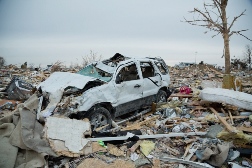Be Prepared for Hurricanes
Hurricane season in the Atlantic begins June 1 and ends November 30. The Eastern Pacific hurricane season begins May 15 and also ends November 30. When a hurricane reaches land, it brings with it the potential for lost lives and severe property damage through flash floods, tidal surges and high winds.
Those who are living, working or vacationing in hurricane zones should take advantage of the advanced warning these storms provide and prepare or evacuate accordingly.
Before a Hurricane
-
Create an emergency kit with enough supplies for three to seven days. Include at least one gallon of water daily per person, non-perishable packaged or canned food and juices, handheld can opener, cooking tools/fuel, paper plates and plastic utensils, blankets and pillows, seasonal clothing and rain gear, a first-aid kit, medications and prescriptions, toiletries, battery operated flashlights and radio with spare batteries, and cash because banks and ATMs may not be available. Make sure your cell phone is fully charged, propane tanks are full as well as your vehicle’s gas tank.
-
Monitor hurricane and tropical storm advisories.
-
Decide whether you will go to a designated shelter, a safer place inland or ride out the storm in your home unless authorities evacuate your area.
-
Utilize hurricane shutters, secure boats and cars, plan an escape route and move unsecured items including flower pots, water hoses and patio furniture inside the house or garage.
-
Take an inventory of all household goods making sure to document model number and brand name.
During a Hurricane
-
Evacuate immediately if ordered to do so.
-
If you’re in your home, stay near the down-wind side of the house.
-
Stay away from windows and glass doors.
-
Keep children in safe areas such as the basement or interior first floor rooms.
-
If the eye of the hurricane passes over your area, be aware that the improved weather conditions are temporary and the storm conditions will return with winds coming from the opposite direction, sometimes in a matter of minutes.
After a Hurricane
-
If you or others are injured and unable to travel, call for help if possible. If phones are not operational, seek help from a neighbor or signal patrol police or emergency crews.
-
If not hurt, stay in a protected area of your home until announcements are made on the radio or television that dangerous winds have passed.
-
Stay away from downed power lines.
-
Do not drink or prepare food with tap water until you are certain it is not contaminated.
-
Notify your insurance company and make insurance claims as soon as possible. Take photos of all damages.






